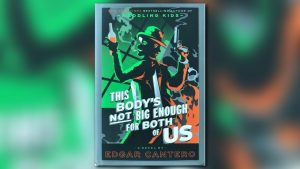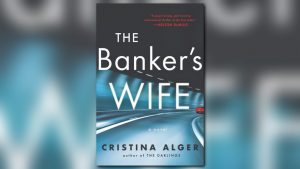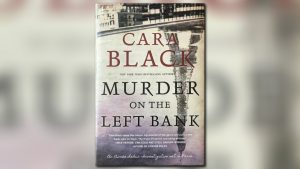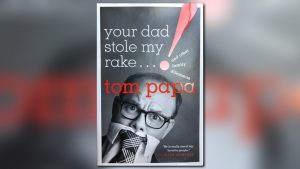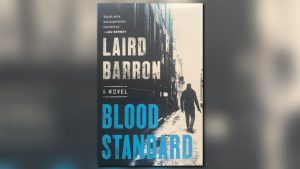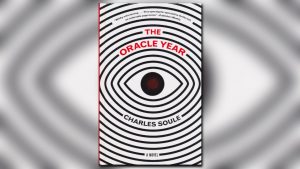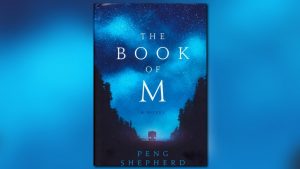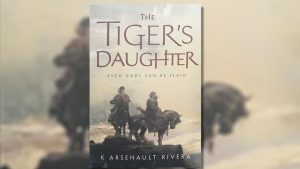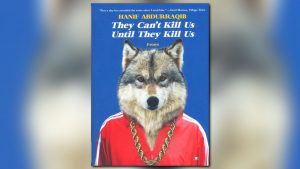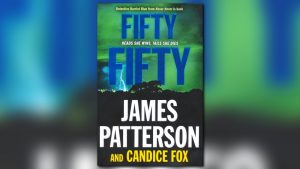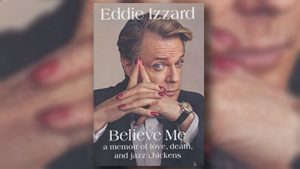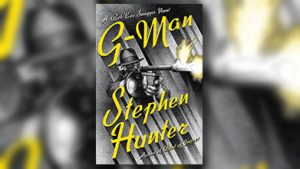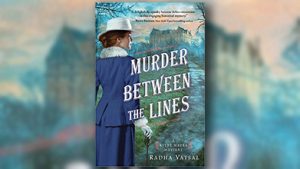“Kinsey and Me” is a collection of short stories that marks the celebration of fiction character Kinsey Millhone’s 30-year success.
Kinsey Millhone is the main character and a private investigator in Sue Grafton’s Alphabet Series.
Kinsey and Me has two parts: nine “Kinsey Stories” and the “And Me” stories.
Grafton says the collection of stories reveal how Kinsey’s path is related to the broader path of Grafton’s past.
The stories transport the reader into a troubled family where they learn that parental distance allows for treasured freedom, but also provides a darker, abandoned realization.
NARRATOR: And now, an Eight original production.
"Books & Co." is made possible by the Virginia G. Piper Center for Creative Writing, serving writers and readers in the Phoenix metropolitan area, the state of Arizona, and the world.
ALBERTO RIOS: Welcome to "Books & Co." I'm your host, Alberto Rios. Bienvenidos, todos. We're joined today by best-selling author Sue Grafton who will be talking about her latest book, "Kinsey & Me," a collection of stories published by Putnam. Welcome, Sue.
SUE GRAFTON: Thank you.
ALBERTO RIOS: This is just an exciting opportunity I think for a lot of your fans to get to hear something about your oeuvre as it were.
SUE GRAFTON: Oeuvre.
ALBERTO RIOS: Lots of oohs and ahs. But you've got a very specific book in front of us that needs some attention paid to it specifically. So we'll start with that.
SUE GRAFTON: All right.
ALBERTO RIOS: This book, we should start by characterizing it. It's really half of one thing and half of another. It's got a real strident structure.
SUE GRAFTON: Right.
The first portion of the book or Kinsey Millhone short stories, many of which have been in print, they were collected once in 1991, my husband did a private printing. The second half are personal stories that come out of my life and part of my objective was to let the reader peek behind the curtain. Kinsey Millhone is my public self. She is my emissary, I send out into the world but there is a dark side from which she brings and I thought let's just let people know how it began.
ALBERTO RIOS: How it began. And that character, is that also another name that isn't quite Sue Grafton?
SUE GRAFTON: That is my younger self. Kinsey Millhone is my alter ego. I have several personalities and if we had time enough I would go through them for you because it's most amusing and I suspect many people have more than one personality.
ALBERTO RIOS: I think that's a pretty good way to think about how you go about writing detective work because you're talked about multiple personalities that are not normal, not your own.
SUE GRAFTON: And some of that's projection. I tend to like villains. I'm very interested in the criminal mentality. I'm always looking -- my prime question is why do people kill each other? You could take up meditation, you could drink too much, there are many alternatives and crime has been with us since Adam and Eve, since Cain killed Abel and my job in life is to look at that to see if I can dramatize it and narrate it in a way that's understandable.
ALBERTO RIOS: You raise an interesting question. As a detective story writer, you're solving a crime but maybe not answering the question why do we kill each other?
SUE GRAFTON: Well, I guess I think in some ways, to teach by example, what I want is for a reader not to agree with the villain's behavior but to understand it at some level, at least to say I get that, I get why that's happening which is why I don't write about psychopaths because there's no logic at play. In my experience, many criminals actually have a little thought, they have a little plan that they seem to think will work. Often it involves taking out insurance on a loved one and a short time later, goodness gracious, our loved one is gone and we think we can collect the money. How many times have we seen that?
ALBERTO RIOS: You're almost describing them writing their own book but with a bad ending.
SUE GRAFTON: One hopes.
ALBERTO RIOS: One hopes, not always true but one hopes. Well, you have this first set of stories, the Kinsey Millhone story in the beginning that are, you know, they work at a pace, they accomplish what they accomplish and they're a lot of fun to read and they go about their business of being detective stories.
SUE GRAFTON: Well, the short story is a very challenging form because the detective novel has a lot of range to it. You've got room to move around. Under it all, there is beginning, middle and end, there's a very careful structure. All of that gets reduced down to a minimum in a short story. I think you still have to have a crime, you still have to have somebody bring it to Kinsey Millhone's attention, there has to be at least the suggestion of suspect, otherwise it's no fun. So within that framework, the trick is to see what you can create in the way of things.
ALBERTO RIOS: What you're describing in so many ways, you had some essays interspersed in the book and we'll talk a little bit about those, in the first you talk about in essence the origins of the detective novel and story and your particular version of your own personal origins in terms of loving this genre but what you're describing right there is kind of what you point out the essay by S.S. dines, 1928, wrote the kind of list of things that a detective novel need to have and intuitively, you follow those. I don't know that you prepared yourself and I'm curious.
SUE GRAFTON: The way I look at the detective novel, it's like playing bridge, which I love, but I love it. You're dealt 13 cards and in that framework, you have to figure out whether or not to play offense, defense, and the rules are very clear. This is also true of detective fiction. Now, some of what he suggested is I think no longer the case. He says no romance.
ALBERTO RIOS: Right.
SUE GRAFTON: He says that the narrator cannot also be the killer because the reader needs to trust that the narrator is telling the truth so you can't at the end say aha I did it myself. So he has ways he suggests going by it.
ALBERTO RIOS: We've seen exceptions to all of it.
SUE GRAFTON: Once you know the rules then you're at liberty to break them if you do it with skill and finesse. There are times when you see a writer break the rules and you think no, no, no. Didn't do it right.
ALBERTO RIOS: Everything seems to play by the rules pretty well and it strikes me that you give us therefore an almost gentle protagonist but --
SUE GRAFTON: She thinks she's very tough.
ALBERTO RIOS: I know she does and she is to the extent of what she's out there doing but she's not brandishing, you know, major weaponry.
SUE GRAFTON: Well, I tried to -- she is flawed and inconsistent like any other human being. I don't want her to be larger than life. Sometimes, people say she's such a great role model and I go no, she's not, she cusses like a sailor, she gets into breaking and entering when it suits her purpose and she lies all the time and that's kind of a silly act to practice.
ALBERTO RIOS: And her wiles are charming in the sense that she has these little secrets she divulges like she bought the black parka because she felt she would be invisible at night and it's so low tech but she's thinking, you know, that I might be out there at night, I might be invisible.
SUE GRAFTON: That was a fun story to write because land's end catalog was doing their 40th anniversary and asked me to write a short story. And I work very intuitively. I have what I call my shadow who does the work and so I just wait to see what shadow thinks of things. This phone call came in and it struck her as funny and so then I came up with a little story element and went through my land's end catalog and picked out what I thought would serve my purposes.
ALBERTO RIOS: The squall parka.
SUE GRAFTON: Very specific.
ALBERTO RIOS: That was a lot of fun to watch her. What struck me was the kind of low-tech thinking that becomes very successful in a thinking person's genre.
SUE GRAFTON: Well, I am writing about the '80s and currently Kinsey Millhone is living and working in 1988, which to me feels like the day before yesterday. And I look back, and I think look how far we have come. 23, 25 years. A life without cell phones, without texting, without the Internet. And what I think it does is it keeps her in a very old-fashioned sense. It doesn't matter how much technology you have. You need law enforcement to put together the elements. It isn't like you feed all this information into a machine that will spit out the culprit. Somebody has to do those interviews and fit together within the framework of the law, which is very complex. So Kinsey is doing what all law enforcement does, which is to look at the facts, conduct interviews and see if she can figure out what's going on.
ALBERTO RIOS: The way you were describing that that she lives outside of cell phones and Internet is almost that phenomenon where if you loss a sense, your others are sharper but she never got that sense. So she's sharper relative to those around her.
SUE GRAFTON: It's human nature. You know, somehow she takes chances that she should not take but don't we all.
ALBERTO RIOS: You have a very quiet line in one of the stories where it just says, and I don't have it here exactly, but it just basically I feel like I'm so close to a little answer but I can't quite make the leap. And it strikes me that's where she always is in the liminal setting.
SUE GRAFTON: That is from a technical point of view, I'm sure you have experienced moments where you go, got it, you know. The human brain, synapses, whatever that is, makes amazing leaps and in a work of fiction, those moments do come to pass but I have to be very careful as a writer that the reader sees the progression so that it doesn't seem like something I've dropped in there at my convenience.
ALBERTO RIOS: That is part of the job of the writer is to go aha but then you've got to write it all down. You can't keep it all in your head.
SUE GRAFTON: I keep notebooks for every novel that I write and currently I'm working on "W," which has no title yet but I'm telling. I have 1,154 single spaced pages of notes.
ALBERTO RIOS: Wow.
SUE GRAFTON: Because I work by trial and error and I'm very slow with it and so I will write -- every 15 pages, I go I've got a great idea, it's the same idea I had 15 pages ago but it is the way I operate. I go down all manner of dead ends. I'll see a road and so that better be good and I get down there and say that isn't good and start again.
ALBERTO RIOS: You physically write it out. You don't outline it or map it.
SUE GRAFTON: I generally have a sense of where I'm going. I don't always know how I'm going to get there. The detective novel is so esoteric. I call us the neurosurgeons of literature. And people don't get it. It looks easy, like somebody killed somebody and all that. But from the point of view of the writer, it's very intricate and so when I talk to people who are interested in the detective novel, I always say cut your teeth on mainstream fiction. Learn how to plot, learn how to do character, learn how dialogue functions. Then if you're interested in the crime novel, the mystery novel, then you've got to go into hyperspace. It is a world apart.
ALBERTO RIOS: Very good advice, and I think so many people would do just the opposite and start --
SUE GRAFTON: You read detective novels and think this seems like fun, I can do that and it takes a while to appreciate how difficult it is. And I'm still learning.
ALBERTO RIOS: Well, let me just take a moment to remind our viewers that you're watching "Books & Co.," I'm Albert rios your host and we're joined by Sue Grafton talking about her latest book, "Kinsey & Me." We've got this whole second half now. And if in the first half we're playing detective along with you, are you asking us to be detectives as well in the second half? Very different.
SUE GRAFTON: Well, I think the second half you are just an observer. I talk about my parents were alcoholics, and that created a very chaotic childhood for me. Now, I have said since and I'm sincere about this, I would not change one moment of that. It was such perfect training for a writer because I grew up very independent. I had a lot of freedom, way more freedom than I should have had probably. I raised myself. And I learned to be a very careful observer of human nature, because when you deal with somebody who's an alcoholic or drug addicted, you better know what's going on. You better observe, you better clue into the mood. It was good, it was good.
ALBERTO RIOS: That second set of stories, very personal or they read as being very personal.
SUE GRAFTON: Oh, they are.
ALBERTO RIOS: Well, then I will take you at your word.
SUE GRAFTON: Absolutely.
ALBERTO RIOS: So they come across almost devastating to the reader. I can't imagine what it was like writing that.
SUE GRAFTON: The route I took with this book is as follows. Everybody wants to know the details. What I'm describing is very difficult, it was my mother's sort of descent into whatever, chaos. And her death and how I dealt with that. She died on my 20th birthday. From a writer's point of view, that's perfect, I know it sounds terrible all these years later but the metaphor is too beautiful. So since I had so many unresolved issues with her and with my father at the time of her death, it took me years to work through that and I did it through writing. And as I said in one of the essays, I discovered whatever moments I remembered, it would cut straight to the core. Everything was connected. It was almost like free form. It was almost like without -- it was pure feeling. And the odd thing about those stories 30, 40 years, exactly as I read them, I might have changed one word here and there, I might have added one tiny clarifying phrase.
ALBERTO RIOS: Their business was not the same as what we had in the first bit of stories. You are personally claiming to set out to solve something. But you also know and we also know there is no solution, this is the nature of the human family, right? And you're on your own personal voyage in that. Very different than the detective in the first.
SUE GRAFTON: I think because I came such a distance through my personal life that at some point, I could lay it to rest. I worked through those issues. I know them by heart as it were, and that then I can bring to the work of the detective novel, which is just as complex.
ALBERTO RIOS: Well, the second set of stories gives us more description in its own way and you set the world for us in a way different from the expediency of the detective novel. You learn what you need to learn and nothing else, you don't need to bother. Here, the felt more willing to say things, whether there was a reason for it or not. It's just the nature of memory.
SUE GRAFTON: And I think memory is a form of fiction anyway. We think we remember clearly, but we don't because the human brain can only carry so much detail. We're forever deleting to make room. It's good to write things down. That's one of the reasons I keep the journals because I can't carry a detective novel in my head. I have to lay it out because writing happens on the page. You think think of fabulous things. Until you get them on the page, they don't exist.
ALBERTO RIOS: A lesson for students.
SUE GRAFTON: Absolutely.
ALBERTO RIOS: Well, in that second group when you're describing things, every now, and then there's an image that just seems startling in its simplicity. And one of my favorites was just this very simple moment where you're describing your mother saying her feet were bare, except for the nylons she wore and her clothes made a lazy circle, idle movements in that otherwise still frame. We all know what that is, she's not moving elsewise, not for you. It's the body or some universal magnetism moment. And those moments are striking and in counterpoint not in judgment, just different, it was watching you as a writer take some risks that were different from what you had done earlier.
SUE GRAFTON: In my personal life, I don't speed or mud or cold or any of that. I don't like to jump out of anything, it's not going to happen so I take my risks on the page and that is so frightening. I can't even tell you. Because where I am in my career, technically speaking, could be anything I wanted but I'm always raising the bar. I'm trying very hard not to repeat myself. I am working to go deeper and take on more and that's why my hair turns gray, I swear.
ALBERTO RIOS: Well, you add a third element now and it's the essays that are in between and you're doing something even different from what the personal and the detectives do. You're expounding. You're making commentary and it's quite lucid.
SUE GRAFTON: Which I don't do generally. I'm capable of arguing and teaching but generally speaking, those essays are organized in a way that a lot of speech would not be, of course.
ALBERTO RIOS: I'm going to do something I don't normally do and ask you to read one paragraph because you talk about how the detective, just the detective, the archetype is change and it's this paragraph here. I found it so compelling.
SUE GRAFTON: Thank you.
Times have changed in the series since mike hammers' hay-day, rage has broken loose in the streets. We live in darker times where the nightmare has been made manifest. Violence is random, pointless and pervasive. Passing motorists are gunned down for the vehicles they drive, teens are killed for their jackets and running shoes. Homicide has erupted on every side of us and a wholesale slaughter of the innocent, even small town America, has been boosted. The handgun is no longer a symbol of law and order, it is the generator of chaos. The bullet leaves carnage in its wake. We are at the mercy of the lawless. The real life counterpoint has been reduced to some sort of foot race. Murder is the beast howling in the basement, rustling unleashed in the faraway reaches of our souls.
ALBERTO RIOS: And you have some more things along those lines. What is so striking about that, that reversal we're seeing, and we're not talking about gun issues, the detective genre where you have that wonderful line that the gun is no longer representative of law and order.
SUE GRAFTON: So what I was looking at there is how our perception of the detective novel has shifted and how the function of the detective novel has shifted It was kind of fun to go back and watch it through the decades.
ALBERTO RIOS: And it's very exciting because you also have this wonderful line saying, even though the detective is the upholder of all of these things right and true, it's the detective who breaks all of those rules, breaking and entering.
SUE GRAFTON: I think -- I think law and order and crime are flip sides of the same coin and I don't know how I feel about that. I vote for law and order. I vote against anarchy.
ALBERTO RIOS: Counter-anarchy, that's a pretty good thing. The well this is a book about books in so many ways and it's a very personal book about your own book. So the essays are an added bonus because they're almost more privileged in the space they come from. It's you not trying to be the writer. It's you simply speaking what you feel and I really liked reading that, appreciated it. It just surprised me, it was so simple, the idea of the gun detective novel has changed. Well, you have written some other books and this is not what we'll be talking about today but you have some alphabet books which I'm sure your fans will want to know that.
SUE GRAFTON: If I can recite them all in order without --
ALBERTO RIOS: Well, you also have some feelings about film rights. We will save that for another time.
SUE GRAFTON: Perfect.
ALBERTO RIOS: I think what I want to do, though, is just say this is a great book for your fans and those who have read the other books will get a great deal out of this and we'll get that little peek into what Sue Grafton was thinking.
SUE GRAFTON: Where I came from.
ALBERTO RIOS: And more importantly where you came from, which was a very complex place. Thank you for doing that, thank you for being with us today. This has been "Books & Co.," I am Alberto Rios, we've been talking today with Sue Grafton about her latest book, Kinsey Millhone. For "Books & Co.," thank you for joining us today and we hope to see you again very soon when we bring you another good book.








